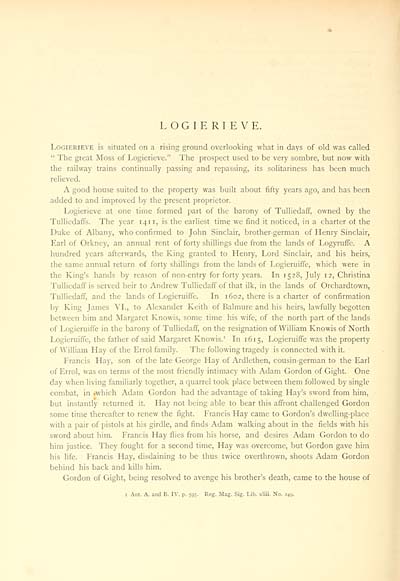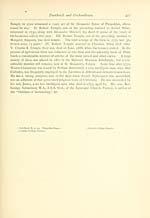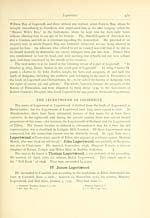New Spalding Club > Thanage of Fermartyn including the district commonly called Formartine
(500) Page 478
Download files
Complete book:
Individual page:
Thumbnail gallery: Grid view | List view

L O G I E R I E V E.
LoGiERiEVE is situated on a rising ground overlooking what in days of old was called
" The great Moss of Logierieve." The prospect used to be very sombre, but now with
the railway trains continually passing and repassing, its solitariness has been much
relieved.
A good house suited to the property was built about fifty years ago, and has been
added to and improved by the present proprietor.
Logierieve at one time formed part of the barony of Tulliedaff, owned by the
Tulliedaffs. The year 141 1, is the earliest time we find it noticed, in a charter of the
Duke of Albany, who confirmed to John Sinclair, brother-german of Henry Sinclair,
Earl of Orkney, an annual rent of forty shillings due from the lands of Logyruffe. A
hundred years afterwards, the King granted to Henry, Lord Sinclair, and his heirs,
the same annual return of forty shillings from the lands of Logieruiffe, which were in
the King's hands by reason of non-entry for forty years. In 1528, July 12, Christina
Tulliedaff is served heir to Andrew Tulliedaff of that ilk, in the lands of Orchardtown,
Tulliedaff, and the lands of Logieruiffe. In 1602, there is a charter of confirmation
by King James VI., to Alexander Keith of Balmure and his heirs, lawfully begotten
between him and Margaret Knowis, some time his wife, of the north part of the lands
of Logieruiffe in the barony of Tulliedaff, on the resignation of William Knowis of North
Logieruiffe, the father of said Margaret Knowis.' In 161 5, Logieruiffe was the property
of William Hay of the Errol family. The following tragedy is connected with it.
Francis Hay, son of the late George Hay of Ardlethen, cousin-german to the Earl
of Errol, was on terms of the most friendly intimacy with Adam Gordon of Gight. One
day when living familiarly together, a quarrel took place between them followed by single
combat, in which Adam Gordon had the advantage of taking Hay's sword from him,
but instantly returned it. Hay not being able to bear this affront challenged Gordon
some time thereafter to renew the fight. Francis Hay came to Gordon's dwelling-place
with a pair of pistols at his girdle, and finds Adam walking about in the fields with his
sword about him. Francis Hay flies from his horse, and desires Adam Gordon to do
him justice. They fought for a second time, Hay was overcome, but Gordon gave him
his life. Francis Hay, disdaining to be thus twice overthrown, shoots Adam Gordon
behind his back and kills him.
Gordon of Gight, being resolved to avenge his brother's death, came to the house of
I Ant. A. and B. IV. p. 595. Reg. Mag. Sig. Lib. xliii. No. 249.
LoGiERiEVE is situated on a rising ground overlooking what in days of old was called
" The great Moss of Logierieve." The prospect used to be very sombre, but now with
the railway trains continually passing and repassing, its solitariness has been much
relieved.
A good house suited to the property was built about fifty years ago, and has been
added to and improved by the present proprietor.
Logierieve at one time formed part of the barony of Tulliedaff, owned by the
Tulliedaffs. The year 141 1, is the earliest time we find it noticed, in a charter of the
Duke of Albany, who confirmed to John Sinclair, brother-german of Henry Sinclair,
Earl of Orkney, an annual rent of forty shillings due from the lands of Logyruffe. A
hundred years afterwards, the King granted to Henry, Lord Sinclair, and his heirs,
the same annual return of forty shillings from the lands of Logieruiffe, which were in
the King's hands by reason of non-entry for forty years. In 1528, July 12, Christina
Tulliedaff is served heir to Andrew Tulliedaff of that ilk, in the lands of Orchardtown,
Tulliedaff, and the lands of Logieruiffe. In 1602, there is a charter of confirmation
by King James VI., to Alexander Keith of Balmure and his heirs, lawfully begotten
between him and Margaret Knowis, some time his wife, of the north part of the lands
of Logieruiffe in the barony of Tulliedaff, on the resignation of William Knowis of North
Logieruiffe, the father of said Margaret Knowis.' In 161 5, Logieruiffe was the property
of William Hay of the Errol family. The following tragedy is connected with it.
Francis Hay, son of the late George Hay of Ardlethen, cousin-german to the Earl
of Errol, was on terms of the most friendly intimacy with Adam Gordon of Gight. One
day when living familiarly together, a quarrel took place between them followed by single
combat, in which Adam Gordon had the advantage of taking Hay's sword from him,
but instantly returned it. Hay not being able to bear this affront challenged Gordon
some time thereafter to renew the fight. Francis Hay came to Gordon's dwelling-place
with a pair of pistols at his girdle, and finds Adam walking about in the fields with his
sword about him. Francis Hay flies from his horse, and desires Adam Gordon to do
him justice. They fought for a second time, Hay was overcome, but Gordon gave him
his life. Francis Hay, disdaining to be thus twice overthrown, shoots Adam Gordon
behind his back and kills him.
Gordon of Gight, being resolved to avenge his brother's death, came to the house of
I Ant. A. and B. IV. p. 595. Reg. Mag. Sig. Lib. xliii. No. 249.
Set display mode to: Large image | Transcription
Images and transcriptions on this page, including medium image downloads, may be used under the Creative Commons Attribution 4.0 International Licence unless otherwise stated. ![]()
| Publications by Scottish clubs > New Spalding Club > Thanage of Fermartyn including the district commonly called Formartine > (500) Page 478 |
|---|
| Permanent URL | https://digital.nls.uk/82218490 |
|---|
| Description | Volumes 47-53 are uniform with but not part of the club's series. |
|---|---|

